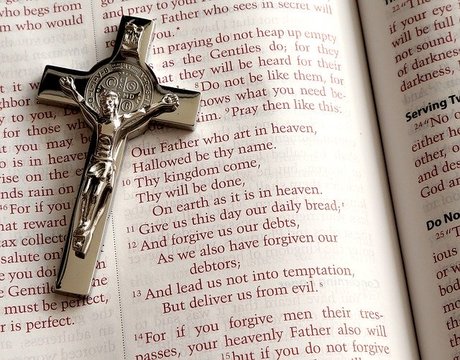Divine Retreat Centre UK – Official Website

Martha or Mary? The Importance of Setting Priorities in Life
October 24, 2021
The Our Father Prayer Explained – Fr. Joseph Edattu VC
October 24, 2021Abraham’s sacrifice of Isaac was the prefiguration of the most important sacrifice of all time that one man made for all of humanity—the Crucifixion of Jesus on Mount Calvary. Both sacrifices happened on the same mountain, Mount Moriah, and showed similar elements in both events. It only means one thing—it’s all a plan of God! In our Christian life, we struggle to know God’s plan and, even more so, to act accordingly to it. By learning the meaning of Abraham’s sacrifice, we will learn how we can have the faith to surrender our own “Isaac” in the hands of God and follow the footsteps of Abraham who is rightfully called the Father of the Faith.
Abraham’s Sacrifice
Abraham, in truth, did not make a sacrifice. He received a “test” from God who told him to make a sacrifice. God said to him, “Abraham!” And he said, “Here I am.” From his words, we can tell Abraham’s obedience to act at God’s bidding. It was an instant response that shows the depth of his relationship with God, the familiarity of God’s voice that he recognizes immediately and the faithfulness he has in following His Word.
When God tells Abraham to take his “only” son Isaac, we will be reminded of his other son, Ishmael, whom he bore through his maidservant. But God chooses Isaac, the one whom Abraham loves and the legitimate child, who prefigures Jesus Christ as the only begotten and beloved son of God the Father. For us, who have the convenience of understanding that the Old Testament is related and revealed in the New Testament, we cannot be disturbed by God asking for a human sacrifice. Abraham, however, didn’t have foreknowledge of God’s plan in offering His Son Jesus. Also, human sacrifices were common among pagans during those times. Yet, Abraham believed in God’s command. Why? Abraham began his journey with God in his sixties or seventies and he was 130+ during the sacrifice of Isaac. If there’s any reason why he listened to God, it’s because it’s a voice that’s familiar, one that he trusts and believes in, one that he has faith in.
Just as Abraham “believed God, and it was reckoned to him as righteousness,” (Galatians 3:6) Abraham believed God and acted on his belief. He rose early in the morning, saddled his donkey, took two of his young men and his son Isaac, cut the wood for the burnt offering and set out for the place God showed him. Abraham was carrying many things with him but no one knows about the pain he is carrying in his heart during this journey. The moment God told him to sacrifice his son, he must have felt he already lost his son then. Still, we would not know what was really going on in his mind until we heard exactly what he said.
Then Abraham said to his young men, “Stay here with the donkey; the boy and I will go over there; we will worship, and then we will come back to you.” (Genesis 22:5) The word “worship” appears here for the first time in the bible and from its context, the true meaning of worship is sacrifice. Abraham himself knew this. But notice that he says something very peculiar: “we will come back to you.” Did he think God will intervene on the way? Did he expect God to come and stop it in between? He knew his son was going to be sacrificed but somehow he had an assurance he would get him again. He knew his son was going to be offered as a burnt offering but somehow he had an assurance that his son would “come back”. This is giving us an important hint about Abraham’s faith, a faith capable of believing what was unheard of and what was unwritten in history. Abraham is giving us an important hint about his belief in the resurrection! Why did Abraham believe that there is a resurrection? Why did he know that Isaac will be sacrificed and then he will come back?
I will bless her, and moreover I will give you a son by her. I will bless her, and she shall give rise to nations; kings of peoples shall come from her.” (Genesis 17:16) Remember what God promised Abraham and Sarah. The God who promised to give them a son is the same God who told Abraham to sacrifice this same son. Therefore, Abraham had confidence in God that even if his son will be offered as a sacrifice, he will come back in order to fulfill the promise. That’s a clear sign that there will be a resurrection.
But God said to Abraham, “Do not be distressed because of the boy and because of your slave woman; whatever Sarah says to you, do as she tells you, for it is through Isaac that offspring shall be named for you. (Genesis 21:12) In the Old Testament, we will read Abraham was assured of God’s promise that it is through Isaac that descendants shall be named after him. In the New Testament, we will read Abraham actually “considered the fact that God is able even to raise someone from the dead—and figuratively speaking, he did receive him back. (Hebrews 11:19) Abraham’s faith rested on his belief in resurrection so he was able to fulfill God’s command with obedience and courage. For his readiness to sacrifice his son for the sake of his faith, he was called the“Father of a multitude of nations.” (Genesis 17:5)
Isaac as the Prefiguration of Jesus
Isaac is the promised child for Abraham and Sarah. Most of us think Isaac was only a boy when he was offered as a sacrifice. In the Jewish religion, however, it is believed Isaac was 30 or 33, just as Jesus was 33 during his crucifixion.
On the third day Abraham looked up and saw the place far away. (Genesis 22:4) It was a three-day journey reaching the mountain where God showed the sacrifice was going to take place. Here, we can see a connection with Abraham’s sacrifice and Jesus’ crucifixion. We will see Abraham getting Isaac back on the third day just as Jesus was resurrected on the third day.
Abraham took the wood of the burnt offering and laid it on his son Isaac, and he himself carried the fire and the knife. So the two of them walked on together. (Genesis 22:6) Isaac carried the wood just like Jesus carried the wooden cross, where they were going to be sacrificed. “Fire” is the symbol of the Holy Spirit and the “knife” is the symbol of suffering and passion. “The two of them walked on together” means the Father and Son are in communion with each other in their suffering.
Then Isaac asked his father,“The fire and the wood are here, but where is the lamb for a burnt offering?” (Genesis 22:7) Abraham said, “God himself will provide the lamb for a burnt offering, my son.” So the two of them walked on together. (Genesis 22:8) Later, this lamb will be revealed as Jesus, the “Lamb of God” (John 1:29) that the Heavenly Father himself will provide as an offering for the salvation of the world.
When they came to the place that God had shown him, Abraham built an altar there and laid the wood in order. He bound his son Isaac, and laid him on the altar, on top of the wood. (Genesis 22:9) Isaac was about 30 years of age, while his father was about 130. If Isaac had wanted to escape, he could’ve done it easily. But he didn’t. He submitted himself silently and willingly to his father, out of obedience. This is the true sense of Jesus’ sacrifice. It was not forced but it was a humble and voluntary acceptance of the father’s will. Isaac was seen laid on top of the wood, just as Jesus was laid on top of the wooden cross.
Then Abraham reached out his hand and took the knife to kill his son. But the angel of the Lord called to him from heaven, and said, “Abraham, Abraham!” And he said, “Here I am.” He said, “Do not lay your hand on the boy or do anything to him; for now I know that you fear God, since you have not withheld your son, your only son, from me.” (Genesis 22:10-12) Abraham showed his fear of God since he had not withheld his son as a sacrifice. Now that he proved his love, commitment and covenant, God in turn showed his love, commitment and covenant by holding Isaac back and offered a ram as a sacrifice. When God knows that we are truly willing to sacrifice, oftentimes he would no longer require it from us. If you live as a martyr, you no longer need to go through martyrdom. God blesses us mightily when we are willing to make a sacrifice—to sacrifice our pleasures, to sacrifice our joy, to sacrifice our “Isaac”—for the sake of our faith.
And Abraham looked up and saw a ram, caught in a thicket by its horns. Abraham went and took the ram and offered it up as a burnt offering instead of his son. (Genesis 22:13) As a symbol of the covenant of God, He provided a ram to be offered as a sacrifice in the place of Isaac. This ram prefigures Jesus as the lamb of God, crowned with thorns. When the ram was sacrificed, Isaac was saved. When Jesus was sacrificed, we are all saved.
Conclusion
When we place Abraham’s sacrifice side by side with the sacrifice of Jesus on Mount Calvary, we will see how everything is connected. Although it happened with an interval of thousands of years, they are similar in nature, in purpose, and in message, which shows how God wonderfully plans our lives.
The place chosen for the sacrifice in itself is significant. It’s a place God intended for sacrifice and worship, as we will see in the history of Israel. The place will become a temple. Solomon began to build the house of the Lord in Jerusalem on Mount Moriah, where the Lord had appeared to his father David, at the place that David had designated, on the threshing floor of Ornan the Jebusite. (2 Chronicles 3:1)
The son chosen for the sacrifice is also significant. Abraham had two sons, Ishmael (the illegitimate son he bore through the maidservant) and Isaac (the legitimate son he bore through Sarah and the one whom he loves). Isaac represents Jesus as the beloved Son, while the rest of us are accepted as the Heavenly Father’s adopted children, through Jesus Christ.
The sacrifice, too, is significant because the act of making an offering as a sacrifice is the true meaning of worship. That’s why in the Catholic Church, we express our worship when we celebrate the Holy Sacrifice of the Mass, wherein we make present the sacrifice of Jesus on Mount Calvary. It’s not a re-enactment of Jesus’s sacrifice and it’s not a memorial of Jesus’ death. It is the sacrifice that Jesus did and it is happening on the altar as it happened 2,000 years ago. We, too, who hear the Mass are in Mount Calvary witnessing the Lord’s perfect sacrifice, made once and for all. Let’s be thankful for these divine revelations that we have received through the Holy Bible.



